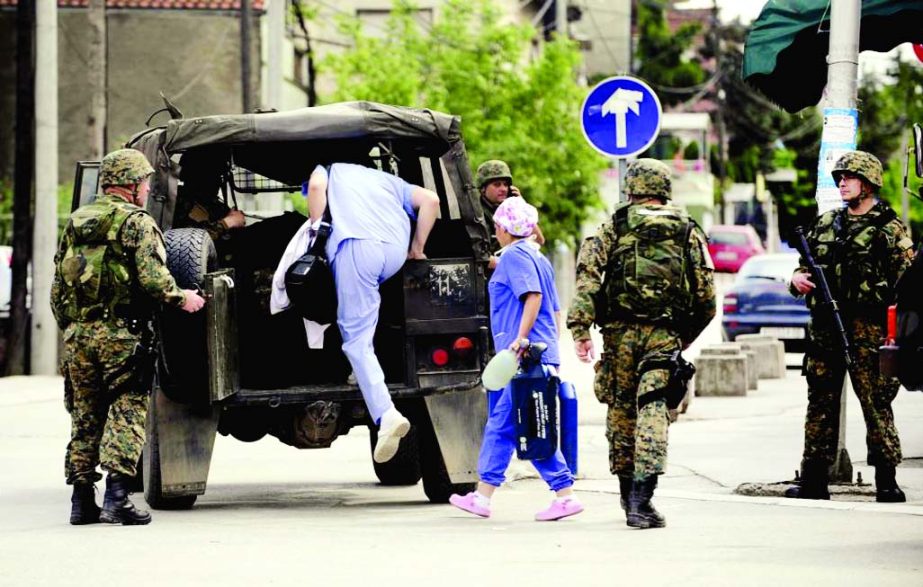
Reuters, Kumanovo :
Eight police officers and 14 members of an “armed group” were killed in a day-long gun battle in an ethnic Albanian suburb of northern Macedonia, the government said on Sunday, violence that added a dangerous twist to months of political crisis.
Sporadic gunfire on Sunday, more than 24 hours after the police operation began, subsided by early afternoon and flat-bed trucks towed away several lightly-damaged armoured vehicles.
The suburb in Kumanovo, 40 km (25 miles) north of the capital Skopje in a region that saw heavy fighting during an ethnic Albanian insurgency in 2001, remained locked down by special police units.
Interior Ministry spokesman Ivo Kotevski told a news conference 37 police officers were also wounded. He said no civilians were reported killed.
The government declared two days of national mourning and President Gjorge Ivanov summoned a meeting of the national security council, inviting leaders of the opposition and the main ethnic Albanian parties in a gesture of unity.
The events, however, will deepen concern in the West over stability in the impoverished Balkan country, where the government is on the ropes over allegations by the main opposition, the Social Democrats, of illegal wire-tapping and widespread abuse of office.
Protesters demanding the resignation of conservative Prime Minister Nikola Gruevski clashed with police last week and the opposition is threatening to rally thousands on May 17.
Observers fear political leaders on either side may try to stoke ethnic tensions as leverage. Albanians in Kumanovo were deeply sceptical of the official version of Saturday’s events.
“This is pure manipulation,” said 40-year-old unemployed man Elham Murad, who fled his home in the Kumanovo suburb after fighting broke out. He said he had seen nothing unusual in the days leading up to the police operation, bar an unmanned drone flying above the town the day before.
“This is a stunt by Gruevski to cover up Zaev’s revelations,” he said. Asked if he would attend the May 17 protest, Murad replied: “I’ll go, dead or alive.”
Police said on Saturday they had acted on information about gunmen planning “terrorist acts” having “infiltrated” the country from a neighbouring state, without saying which. Explosions and heavy automatic gunfire rang out and black smoke rose above the town. Some residents left, carrying their belongings in bags.
Macedonia has previously identified armed men in the country as coming from neighbouring Kosovo, which is majority-Albanian and broke from Serbia in war in 1999.
An estimated 30 percent of Macedonia’s 2 million people are ethnic Albanians. Guerrillas took up arms in 2001, clashing with security forces before the West brokered a peace deal offering the Albanian minority greater rights and representation and the insurgents entered government.
But implementation has been slow and tensions sometimes flare. Many citizens, regardless of ethnicity, are frustrated at the slow pace of development and integration with the West. Macedonia’s bid to join the European Union and NATO is blocked by a long-running dispute with Greece over the country’s name.
Eight police officers and 14 members of an “armed group” were killed in a day-long gun battle in an ethnic Albanian suburb of northern Macedonia, the government said on Sunday, violence that added a dangerous twist to months of political crisis.
Sporadic gunfire on Sunday, more than 24 hours after the police operation began, subsided by early afternoon and flat-bed trucks towed away several lightly-damaged armoured vehicles.
The suburb in Kumanovo, 40 km (25 miles) north of the capital Skopje in a region that saw heavy fighting during an ethnic Albanian insurgency in 2001, remained locked down by special police units.
Interior Ministry spokesman Ivo Kotevski told a news conference 37 police officers were also wounded. He said no civilians were reported killed.
The government declared two days of national mourning and President Gjorge Ivanov summoned a meeting of the national security council, inviting leaders of the opposition and the main ethnic Albanian parties in a gesture of unity.
The events, however, will deepen concern in the West over stability in the impoverished Balkan country, where the government is on the ropes over allegations by the main opposition, the Social Democrats, of illegal wire-tapping and widespread abuse of office.
Protesters demanding the resignation of conservative Prime Minister Nikola Gruevski clashed with police last week and the opposition is threatening to rally thousands on May 17.
Observers fear political leaders on either side may try to stoke ethnic tensions as leverage. Albanians in Kumanovo were deeply sceptical of the official version of Saturday’s events.
“This is pure manipulation,” said 40-year-old unemployed man Elham Murad, who fled his home in the Kumanovo suburb after fighting broke out. He said he had seen nothing unusual in the days leading up to the police operation, bar an unmanned drone flying above the town the day before.
“This is a stunt by Gruevski to cover up Zaev’s revelations,” he said. Asked if he would attend the May 17 protest, Murad replied: “I’ll go, dead or alive.”
Police said on Saturday they had acted on information about gunmen planning “terrorist acts” having “infiltrated” the country from a neighbouring state, without saying which. Explosions and heavy automatic gunfire rang out and black smoke rose above the town. Some residents left, carrying their belongings in bags.
Macedonia has previously identified armed men in the country as coming from neighbouring Kosovo, which is majority-Albanian and broke from Serbia in war in 1999.
An estimated 30 percent of Macedonia’s 2 million people are ethnic Albanians. Guerrillas took up arms in 2001, clashing with security forces before the West brokered a peace deal offering the Albanian minority greater rights and representation and the insurgents entered government.
But implementation has been slow and tensions sometimes flare. Many citizens, regardless of ethnicity, are frustrated at the slow pace of development and integration with the West. Macedonia’s bid to join the European Union and NATO is blocked by a long-running dispute with Greece over the country’s name.

